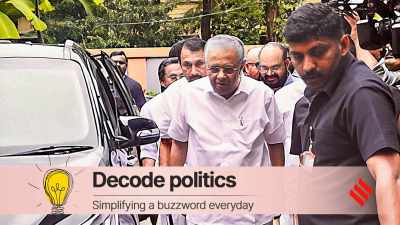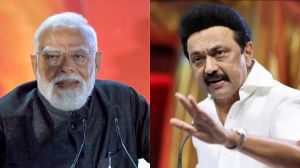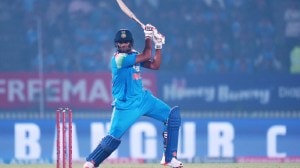Caste aside illusion
The last few months have witnessed the passing away of another illusion. Caste politics was seen by many as one of the defining narratives o...

The last few months have witnessed the passing away of another illusion. Caste politics was seen by many as one of the defining narratives of Indian politics in two senses. In a mundane sense, caste is often seen as a determinant of political behavior. To what extent it really is, is debatable. But, in a more profound sense, the narrative of caste-based politics was seen as a profoundly emancipatory narrative.
This would be the ideological axis that would stop Hindutva in its tracks, that would deliver social justice to the most oppressed, signify a deepening of Indian democracy where the hitherto oppressed took the reins of power to shake society out of its inegalitarian stupor. Great hopes were invested in OBCs, Dalits and Adivasis. Not since Marx had reposed his hopes in the proletariat, had any other social groups had to carry such burden of being agents of social change. These oppressed groups, too, had nothing to lose but their chains; they too were not morally contaminated by occupying positions of power. Like the proletariat, their suffering would give them a unique consciousness about society that would allow them to transform it.
Certainly a great deal of churning resulted. The social composition of politics and government began to change; orthodox Manuwadis went scurrying for cover, even the brahminical BJP had to accept Mandal. Laloo and Mayawati became harbingers of the self-respect of millions. Democracy was coming of age. Only resentful upper caste folk could think otherwise. In urban India, upper castes took to seceding from public institutions; in the countryside, they often resorted to even greater atrocities. Brutal caste violence continued, but even this had a silver lining 8212; it showed that oppression was not going unchallenged. The age of emancipation was finally at hand.
|
If anyone had faith in the unambiguously emancipatory trajectory of caste politics, the last few months have come as a shock |
To be sure there were hiccups on the way. Laloo was in the process of taking Marx8217;s advice to the proletariat seriously: once the oppressed seize the state apparatus, they should dismantle it. Mayawati was trying to ensure that the best way of expressing solidarity with her constituents was by making sure that UP remained where it was in human development. But these infractions were simply part of the process of consciousness-raising. An insolent and conflictual polity that weakened the hold upper castes had on political power was, we surmised, better than the insidious torture that India8217;s social system has heaped upon its less privileged. What good had the existing system of protecting privileges ever done for the downtrodden? Will not a system that had perfected the art of humiliation produce a competitive and violent politics in turn, bereft of any reciprocity?
There was much truth in this description. It drew its pathos from the fact that all the promises made to dismantle the most insidious forms of human inequality any society had ever devised had failed: Gandhism was no more than a patronising gesture, Nehruvianism with its great hopes in the emancipatory power of the state was floundering, and the great liberal project of treating individuals as individuals was simply rendering oppression invisible. A major shake-up was required as a prelude to social justice.
If anyone had faith in the unambiguously emancipatory trajectory of this revolution, the last few months came as a shock. Mayawati8217;s cosying up to the BJP, whatever the compulsions of politics, lay to rest illusions that north India8217;s first great Dalit-based party would herald a new dawn. The participation of Adivasis in violence against Muslims in Gujarat destroyed any hope that shared vulnerabilities produce shared solidarities. Mandal is no longer the enduring antidote to Mandir that we hoped it would be. The so called anti-caste crusades in north India, turn out, on inspection to have been nothing other that anti-upper caste stratagems, which is not quite the same thing. In keeping with India8217;s tradition of involuted pluralism, the deeper, more intractable and violent fault lines are everywhere evident between Dalits and OBCs and among the Dalits themselves.
The term 8216;upper caste8217; oppression is still used profusely, but now it is used simply to refer to any new group that acquires power. Outside of intellectual circles, which always have an investment in hope, nobody in politics seems to believe in shared solidarities of the oppressed. Caste solidarity went the way of class solidarity.
Of course the inequalities and oppressions that occasioned the need for a struggle for social justice continue unabated. It is important not to let the cynicism induced by the sordid and corrupt forms that caste politics have taken, to obscure the real suffering this social system so diligently reproduces and so casually tolerates. But one thing is clear. These will require, as the recent Bhopal declaration acknowledges, an even more imaginative response than simply having faith in the power of the oppressed to eliminate the sources of oppression once they gain power.
No social group, as a group that is, can be a unique and unequivocal bearer of an emancipatory aspiration. The oppressed in our system ought to command our moral attention because that is the demand for justice. But often the trust we repose in those who claim to have arisen from the mantle of oppression is misplaced. It is a reflection more of our desire to avoid misanthropy than of actual political realities. To avoid hating the world we hope that its victims will, at least, carry forward the cause of justice. But to idealise every political disposition that seeks to legitimise itself in the moral aura of victimhood is a dangerous illusion.
The defenders of Mandal were right: access to power is a great leveler. It politicises different sections of society in similar ways. And opponents of Mandal were wrong to fear that caste politics divides society. For it is now abundantly clear that what those who engage in caste politics share is far more important than what divides them: a taste for politics. Caste politics is the triumph of politics over caste. It is the end of an illusion.
The writer is a professor of philosophy and of law and governance, JNU
- 01
- 02
- 03
- 04
- 05































